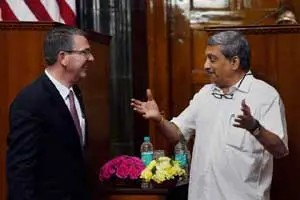India and the US on Tuesday agreed in principle to share military logistics as both sides seek to counter the growing maritime assertiveness of China, but the prospective deal — a tweaked version of the logistics support agreement (LSA) — to be clinched in “weeks” or “coming months” won’t entail deployment of American troops on Indian soil.
Addressing a press conference with US defence secretary Ashton Carter, defence minister Manohar Parrikar said “the growing interaction between armed forces of the two countries is a significant aspect of bilateral relationship” and pointed out that India has more joint exercises with the US than any other country in the world. “In this context, secretary Carter and I agreed, in principle, to conclude a logistic exchange memorandum of agreement (LEMOA) in the coming months,” Parrikar said.
India has had concerns that a logistics agreement would commit it to hosting US troops at its bases, or draw it into a military alliance with the US. The previous UPA government was against signing an LSA with Washington precisely for this reason.
The US has for years urged New Delhi to sign an LSA that allows the two militaries to use each other’s land, air and naval bases for resupply, repair and rest. India’s chance of stance is also in the context of the Modi government’s keenness to access US technology for the “Make in India” plans to build a domestic industrial base and cut expensive arms imports.
What is on the cards now is LEMOA, which facilitates the provision of logistical support, supplies and services between the US military and the armed forces of partner countries on a reimbursable basis, and provides a framework that governs the exchange of logistics support, supplies and services.
Explaining the proposed agreement, Parrikar said it is for providing logistics whenever they need fuel or other support during operations like the humanitarian exercise done in wake of the devastating earthquake in Nepal.
“This will help if any such situation comes up. Logistics is a very important part of the operation. It will be on case by case basis,” Carter said, adding that “all issues” relating to the deal have been resolved.
The two countries have also agreed to set up a new bilateral maritime security dialogue. “We have also decided to enhance our ongoing navy-to-navy discussions to cover submarine-related issues. Both countries will also deepen cooperation in maritime domain awareness by finalising a ‘white shipping’ agreement,” Parrikar said. This came as India and the US emphasised freedom of navigation and the need for an international-based order, in an apparent reference to China’s assertiveness in the South China Sea.
A joint statement said: “Bilateral defence cooperation is a key component of the strategic partnership between India and the US. Secretary Carter’s visit marked the fourth meeting between him and defence minister Parrikar within a year, demonstrating the regular ministerial-level oversight of the robust and deepening bilateral defence relationship.”
The two sides discussed the priorities for the coming year in defence ties, as well as specific steps both sides will take to pursue those priorities. These included expanding collaboration under the Defence Technology and Trade Initiative (DTTI); Make in India efforts; new opportunities to deepen cooperation in maritime security and maritime domain awareness; military-to-military relations; knowledge partnership in the field of defence; and regional and international security matters of mutual interest.
India and the US have agreed to initiate two new DTTI pathfinder projects on digital helmet-mounted displays and the joint biological tactical detection system. They commended the ongoing discussions at the jet engine technology joint working group and the joint working group on aircraft carrier technology cooperation.
Both countries agreed to work towards greater cooperation in the field of cutting-edge defence technologies, including deepening consultations on aircraft carrier design and operations, and jet engine technology. They noted the understanding reached to conclude an information exchange annex to enhance data and information sharing specific to aircraft carriers.
(With agency inputs)
Materiel benefit
$10 billion – India’s defence contracts bagged by US firms over the past decade
$3-billion – deal struck in September last year for purchase of 22 Apache attack helicopters and 15 Chinook heavy-lift choppers from Boeing
$55 billion – worth contract was signed by the two nations last October to build next- generation long-range
strike bombers


